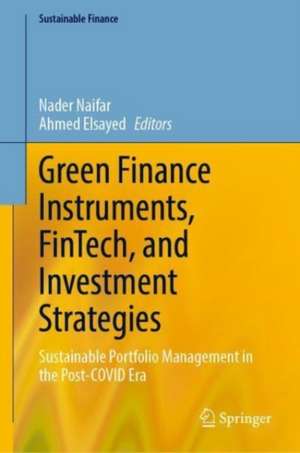Green Finance Instruments, FinTech, and Investment Strategies: Sustainable Portfolio Management in the Post-COVID Era: Sustainable Finance
Editat de Nader Naifar, Ahmed Elsayeden Limba Engleză Hardback – 25 iun 2023
| Toate formatele și edițiile | Preț | Express |
|---|---|---|
| Paperback (1) | 395.20 lei 3-5 săpt. | +22.08 lei 4-10 zile |
| Springer International Publishing – 25 iun 2024 | 395.20 lei 3-5 săpt. | +22.08 lei 4-10 zile |
| Hardback (1) | 568.22 lei 3-5 săpt. | +25.87 lei 4-10 zile |
| Springer International Publishing – 25 iun 2023 | 568.22 lei 3-5 săpt. | +25.87 lei 4-10 zile |
Din seria Sustainable Finance
- 24%
 Preț: 821.76 lei
Preț: 821.76 lei - 17%
 Preț: 395.20 lei
Preț: 395.20 lei - 17%
 Preț: 493.47 lei
Preț: 493.47 lei - 17%
 Preț: 393.97 lei
Preț: 393.97 lei - 15%
 Preț: 497.77 lei
Preț: 497.77 lei - 17%
 Preț: 365.85 lei
Preț: 365.85 lei - 15%
 Preț: 592.44 lei
Preț: 592.44 lei -
 Preț: 401.42 lei
Preț: 401.42 lei - 18%
 Preț: 771.53 lei
Preț: 771.53 lei - 15%
 Preț: 588.18 lei
Preț: 588.18 lei -
 Preț: 377.57 lei
Preț: 377.57 lei - 18%
 Preț: 776.09 lei
Preț: 776.09 lei - 18%
 Preț: 773.41 lei
Preț: 773.41 lei - 18%
 Preț: 1118.45 lei
Preț: 1118.45 lei - 15%
 Preț: 696.68 lei
Preț: 696.68 lei - 15%
 Preț: 699.93 lei
Preț: 699.93 lei - 15%
 Preț: 468.90 lei
Preț: 468.90 lei
Preț: 568.22 lei
Preț vechi: 710.27 lei
-20% Nou
Puncte Express: 852
Preț estimativ în valută:
108.76€ • 118.18$ • 91.42£
108.76€ • 118.18$ • 91.42£
Carte disponibilă
Livrare economică 31 martie-14 aprilie
Livrare express 14-20 martie pentru 35.86 lei
Preluare comenzi: 021 569.72.76
Specificații
ISBN-13: 9783031290305
ISBN-10: 3031290305
Pagini: 300
Ilustrații: XII, 300 p. 25 illus., 24 illus. in color.
Dimensiuni: 155 x 235 x 25 mm
Greutate: 0.62 kg
Ediția:2023
Editura: Springer International Publishing
Colecția Springer
Seria Sustainable Finance
Locul publicării:Cham, Switzerland
ISBN-10: 3031290305
Pagini: 300
Ilustrații: XII, 300 p. 25 illus., 24 illus. in color.
Dimensiuni: 155 x 235 x 25 mm
Greutate: 0.62 kg
Ediția:2023
Editura: Springer International Publishing
Colecția Springer
Seria Sustainable Finance
Locul publicării:Cham, Switzerland
Cuprins
Part 1: Green Finance, Sustainability, and Investment Strategies.- Chapter 1. Multi-criteria Decision Analysis for Sustainable Green Financing in Energy Sector.- Chapter 2. The Development of the Global Green Finance Market: the Role of Banks and Non-banking Institutional Investors.- Chapter 3. Corporate Social Responsibility and Bank Credit Ratings.- Chapter 4. The Impact of Banking on Sustainable Financial Practices Towards an Equitable Economy.- Chapter 5. Ethical and Socially Responsible Investments in the Islamic Financial Framework: Heart, Mind, and Money: Religious Believes and Financial Decision-making.- Chapter 6. Malaysia’s Sustainable Banking Regulatory Framework: Value-based Intermediation and Climate Change Principle-based Taxonomy.- Part 2: the Impact of Fintech and Investment Sustainability.- Chapter 7. The Impact of the Digital Economy Paradigm on Investment Sustainability in Oman.- Chapter 8. The Sandbox in Saudi Arabia: a Regulatory Approach and Applications.- Chapter9. Risk Factors in Cryptocurrency Investments and Feasible Solution to Mitigate Them.- Chapter 10. The Examination of Shariah Compliance of Equity Crowdfunding Companies in Indonesia.- Chapter 11. Fintech and Banking: an Indian Perspective.- Chapter 12. Green Finance and Fintech: Towards a More Sustainable Financial System.
Notă biografică
Dr. Nader Naifer is a Professor of Finance at the Imam Mohammad Ibn Saud Islamic University (IMSIU) in Riyadh, Saudi Arabia. He teaches Corporate Valuations, Advances Topics in Finance, Real Estate Finance & Investment, Financial Management, and Corporate Finance, among others. In addition, his research focuses on energy markets, Islamic finance, credit derivatives, green finance, fintech, and financial stability.
Dr. Ahmed Elsayed is Associate Professor in Economics at Durham Business School (UK). He teaches Economic Theory, Macroeconomics, Quantitative Methods, Financial Markets and Institutions and Financial Econometrics. His main research interests are in the areas of contagion and financial crises, middle east and emerging financial markets, financial integration, islamic finance, energy economics, information transmission, and volatility modelling. In addition, Ahmed is a Senior Fellow of the Higher Education Academy and a member of Institute for Middle Eastern and Islamic Studies.
Textul de pe ultima copertă
In the COVID 19 post-pandemic era, sustainable financial systems are increasingly getting the attention they deserve, and policymakers are now moving toward investment and financing decisions based on sustainable development. Green finance plays an important role in mobilizing financial resources and hedging against environmental risk to achieve financially sustainable systems. Moreover, green financial instruments offer viable alternatives for investors and regulators with regard to portfolio management and risk minimization. Over the last few years, financial technology (FinTech) has grown to become one of the most topical areas in the global financial services industry. The development of distributed ledger technology, big data, smart contracts, peer-to-peer lending platforms, biometrics, and new digital has sparked innovation in the financial services industry and the development of new financing and investment strategies. The combination of sustainability and FinTech can help policymakers to achieve ESG targets when making investment and financing decisions.
This book showcases a collection of recent advances in green finance and FinTech and explores their impact in achieving sustainable finance, investment strategy-making, and portfolio management. Presenting theoretical frameworks and the latest empirical studies in the field of green finance and FinTech, it offers a valuable asset for academics, professionals, policymakers, regulators, and investors who want to understand in-depth the impact of green finance and FinTech on future investment and financing strategies in the post-pandemic era.
Caracteristici
Includes in-depth discussions on how green finance helps to achieve sustainability goals Discusses the impact of financial innovation and cryptocurrencies Provides examples of sustainable investment models
